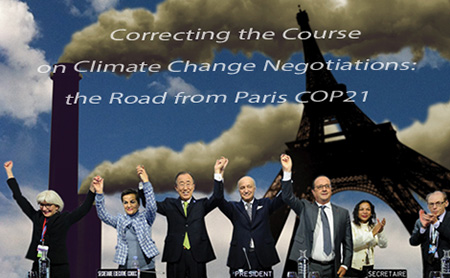Correcting the Course on Climate Change Negotiations: the Road from Paris COP21
Published Date
By:
- Dolores Davies
Share This:
Article Content

On February 24, the University of California, San Diego Library will sponsor Correcting the Course on Climate Change Negotiations: the Road from Paris COP21, featuring climate change policy expert David Victor and students Joaquin Vallejo and Shayla Ragimov, who attended COP21, and will provide their insights on the process and the outcome. The event is free and open to the public and will be held at 5:30 p.m. in the Seuss Room in Geisel Library.
David Victor, a professor of international relations at UC San Diego’s School of Global Policy & Strategy, has been a participant in the Intergovernmental Panel on Climate Change (IPCC) proceedings since the IPCC’s inception, and was a party to the negotiations in Paris. School of Global Policy and Strategy students Joaquin Vallejo and Shayla Ragimov, who accompanied Victor at the Paris talks, were part of the large UC San Diego Scripps Institution of Oceanography delegation, and helped to advocate for an increased recognition of the role of oceans in the new climate. Victor, who has been an astute observer of and an active contributor to climate change negotiations since the late 1980s, believes there are very specific reasons why COP21, while not without its flaws, was more productive than any climate negotiations in the last 20 years.
Victor, co-director of the Laboratory on International Law and Regulation, is the author of Global Warming Gridlock, his 2011 book which argued that a “radical rethinking” of global warming policy was needed in order to make international law more effective in bringing about international compacts to reduce global emissions. The Paris Climate Change Conference (COP21), held in December 2015, employed the “bottom-up approach” Victor advocated in his book, producing an international agreement that sets both short and long term targets for reducing emissions worldwide. Last year, Victor also wrote a paper for the journal, Nature, which pushed for a more streamlined and less constricted focus that would better integrate the social sciences in the climate change policy process, to more effectively address related social, political, and psychological issues.
Prior to joining UC San Diego in 2009, Victor served as director of the Program on Energy and Sustainable Development at Stanford University, where he was a professor at Stanford Law School and taught energy and environmental law. Earlier in his career he also directed the science and technology program at the Council on Foreign Relations and led the International Institute for Applied Systems Analysis. In addition to his research on climate change policy, Victor’s interests surround energy policy, including the future role of natural gas, electric power market reform, and rural energy development—as well as the related trade policy, the role of technology, and innovation and competition in development. Victor received his Ph.D in political science from the Massachusetts Institute of Technology and his B.A. degree in history and science from Harvard University.
Joaquin Vallejo is pursuing an M.A. degree in international affairs at the School of Global Policy and Strategy, with a focus on international environmental policy and the Latin American region. Last year, Vallejo worked as a Policy Fellow at the World Wildlife Fund project “Amazon Vision: Protected Areas as Natural Solutions to Climate Change,” where he negotiated a declaration on the role of protected areas in the fight against climate change. Some 19 Latin American countries adopted this declaration and presented it at the Paris conference in December. During COP21, Vallejo supported the World Wildlife Fund, as well as the UC San Diego Scripps Institution of Oceanography delegation, which advocated for the recognition of the role of oceans in the new climate change agreement. His research focuses on the role of protected areas in climate change mitigation. Vallejo is currently a Dean’s Fellow and serves as the president of the Pacific International Affairs Student Organization and as co-director of the Environmental Policy and Business Forum.
Shayla Ragimov, whose parents emigrated to the U.S. from Azerbaijan, recently completed her M.A. degree in international affairs at the School of Global Policy and Strategy, specializing in international environmental policy and Latin America. She has completed internships with the International Crisis Group in Tbilisi, Georgia, as well as Wireless Reach and Qualcomm. She spent last summer in Brazil’s Amazon, where she worked on a carbon credit project with the Rainforest Standard. Ragimov attended COP21 in support of the UC San Diego Scripps Institution of Oceanography delegation, and helped to advocate for the inclusion of the ocean in the Paris Agreement.
Share This:
You May Also Like
Stay in the Know
Keep up with all the latest from UC San Diego. Subscribe to the newsletter today.



